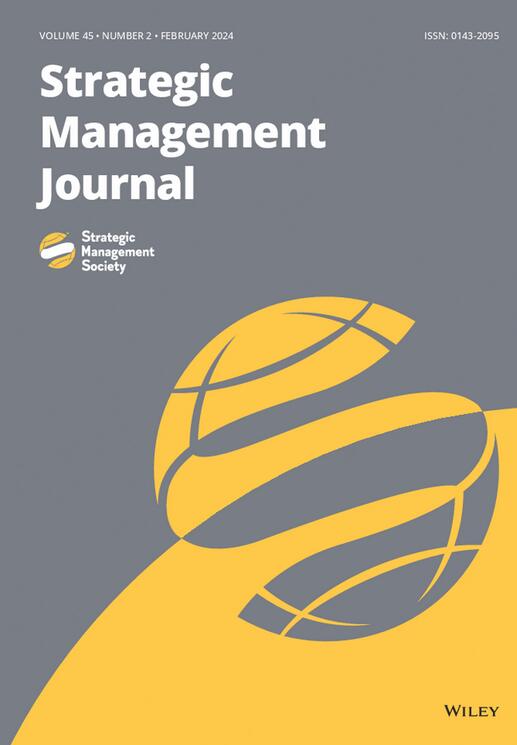Heterogeneous adaptability: Learning, cash resources, and the fine‐grained adjustment of misaligned governance
IF 7.2
1区 管理学
Q1 BUSINESS
引用次数: 1
Abstract
When can a firm make fine‐grained adjustments to misaligned subsidiary governance? We examine whether and under what conditions a firm will adapt the equity stake it owns in a subsidiary, enabling improved alignment of the stake with the uncertainty in the local environment. We predict that the rate of adaptation of misaligned equity stakes depends on the experiential and vicarious learning from which the firm can draw, and that these learning effects are contingent on possessing fungible slack resources, specifically cash. Using a sample of 726 Japanese‐foreign subsidiaries established in 38 host countries over a 21‐year period, we find support in line with our predictions. Overall, this study explicates heterogeneous adaptability in subsidiary governance and similar strategic tasks.Whether due to suboptimal choices or changing conditions, firms must sometimes change how they relate with and control their subsidiaries. Whereas much research has addressed adaptation in the form of discrete changes in ownership mode, we examine under what conditions a firm can make fine‐grained adjustments to misaligned subsidiary governance. We argue that a firm can learn to make such adjustments, not only from its own experience but also vicariously by observing other firms in the same foreign environment. Furthermore, we consider whether cash is a valuable resource for this purpose. Overall, this study shows how firms can pursue strategic adaptation in subsidiary governance and related tasks.异构适应性:学习、现金资源和对错位治理的精细调整
公司何时可以对不一致的子公司治理进行精细调整?我们研究了一家公司是否以及在何种条件下会调整其在子公司的股权,从而改善股权与当地环境的不确定性的一致性。我们预测,错位股权的适应率取决于公司可以从中汲取的经验和替代学习,而这些学习效果取决于拥有可替代的闲置资源,特别是现金。在21年的时间里,我们对在38个东道国设立的726家日本-外国子公司进行了抽样调查,发现这些支持与我们的预测一致。总体而言,本研究阐述了子公司治理和类似战略任务中的异质适应性。无论是由于次优选择还是不断变化的条件,公司有时都必须改变与子公司的关系和控制方式。尽管许多研究都以所有权模式的离散变化的形式解决了适应问题,但我们研究了在什么条件下,公司可以对错位的子公司治理进行精细调整。我们认为,一家公司不仅可以从自己的经验中学习做出这种调整,还可以通过观察同一外国环境中的其他公司来间接地做出这种调整。此外,我们还考虑现金是否是这方面的宝贵资源。总体而言,本研究表明了企业如何在子公司治理和相关任务中寻求战略适应。
本文章由计算机程序翻译,如有差异,请以英文原文为准。
求助全文
约1分钟内获得全文
求助全文
来源期刊

Strategic Management Journal
Multiple-
CiteScore
13.70
自引率
8.40%
发文量
109
期刊介绍:
At the Strategic Management Journal, we are committed to publishing top-tier research that addresses key questions in the field of strategic management and captivates scholars in this area. Our publication welcomes manuscripts covering a wide range of topics, perspectives, and research methodologies. As a result, our editorial decisions truly embrace the diversity inherent in the field.
 求助内容:
求助内容: 应助结果提醒方式:
应助结果提醒方式:


